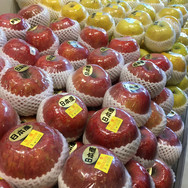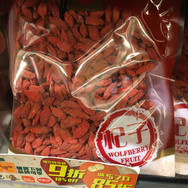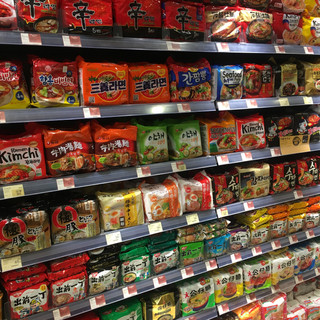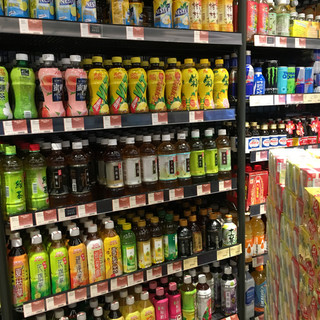Carbohydrate Palace
- Vicky Sham

- May 11, 2018
- 6 min read
Our relocation from New York to Hong Kong means that we are experiencing lots of changes to our lives, daily routine, sleeping patterns, exercise regime and dietary habits. I am excited by this new adventure and keen to find out how it all compares. Where is a good place to find matcha powder, acai, grass-fed dairy and a whole bunch of nut flour and grains for my baking?
From New York…
New York has seriously spoiled me, there are a whole variety of grocery shops and restaurants to address pretty much every dietary preference and requirement. There are plenty of vegan restaurants, from casual to fine dining, and pressed juice shops are as available as any Dunkin' Donut outlets. One of my favourite restaurants is Bouley at Home in Flatiron NYC, the immersive experience and focus on healthy and nutritious food just blew me away. Admittedly it is not the kind of restaurant that you go every day but I am glad to have experienced it before we left the city.
Most restaurants in New York (all the way from casual diners to high end ones) would have options for gluten-free, kosher, nut-free and vegetarian. In terms of supermarkets, there are Whole Foods, Trader Joe's, local supermarkets, farmers markets, online organic food delivery from Thrive Market and Vitacost, and meal kits delivery services such as Blue Apron, Sun Basket, Hello Fresh with vegan, vegetarian, paleo, gluten-free and diabetes-friendly options. You can get the highest quality foods within two hours with just a few clicks on a mobile app, thanks to Instacart, Foodkick and AmazonFresh. As for meal kits delivery services, I personally am not a fan because of the amount of packaging it uses, however there is at least one meal kit delivery business already using recyclable and compostable containers. It is true these shops and services are expensive but it is almost worth it for the convenience and easy access to high quality produce, such as certified organic, sustainable and locally sourced fresh foods from organic farmers, ranchers, fishermen and producers who are Certified Humane .
To Hong Kong
My first couple of weeks in Hong Kong have been interesting, I got super excited walking around supermarkets checking out available options. I was surprised by the eclectic mix of local and imported foods from Asia, Australia and beyond. You could get strawberries from Japan and Spain -beautifully presented and wrapped in plastic but I haven't seen anything that says organic, beef from the US and Australia, dairy such as milk, cheese and yogurt from the UK, US, Australia, New Zealand and of course Hong Kong. There is a much wider choice of tropical fruits, fresh seafood and leafy green vegetables compared to what I experienced in the US. Dried seafood, herbal medicine and tonic foods (e.g. ginseng, bird's nest) are very popular health foods in the Chinese culinary world. Maybe it is just a matter of me learning more about the benefits of Chinese herbal remedies and trying a few recipes.
Carbohydrate Palace
The thing about Asia is that rice and noodles are the staples in most meals. I am brought back to the foods I grew up with, like rice, noodles, vermicelli, dumplings, sweet buns, paired with sugary drinks like Vitasoy (sweet soy juice), lemon tea, milk tea or coffee. I have forgotten the amount of processed refined carbohydrates we consume in a Chinese diet. It has actually been challenging to eat out and eat low-carb in Hong Kong, I still haven't figured out how to avoid grains or carbohydrates whilst not feeling deprived. In some ways the Chinese diet is not too dissimilar to the Standard American Diet in terms of the amount of carbohydrate intake. The key differences are the amount of leafy green vegetables, fermented pickles and tonic foods in the Chinese diet, which helps to achieve a more balanced consumption of the three macronutrients carbohydrates, proteins and fats and micronutrients such as minerals, vitamins and fibre.
The Search for Everything Almond
My search for organic raw almonds, almond milk and almond butter didn't go as well as the search for my childhood treats. On the bright side, as long as you are willing to pay up, pretty much everything is available in all the high end supermarkets and health food stores. In local supermarkets, there is a wide range of roasted and salted almonds but organic raw almonds are harder to find. Why am I so nuts about raw over roasted? It's because the roasting process removes some of the healthy nut oil to prevent their products from going rancid, the nuts are less likely to spoil and have longer shelf life, which means better margins for the food retailers/ manufacturers. Whilst roasted nuts are tastier, they also come with more sugar, salt and preservatives, and less nutritious than raw nuts. If you want to aim for healthier versions of whatever food, go for as little processing as possible. As for almond milk, there are several shelf-stable brands that require no refrigeration, again these are less nutritious than "fresh" ones that need refrigeration. Finally, the search for almond butter, which is also my go-to, pre-run fix, has been very interesting. In a funny way, the combined space for almond, cashew and hazelnut butter is usually only a fraction of the space dedicated to stocking peanut butter.

Traditional Chinese Foods are Healthy
A traditional Chinese meal, or at least the typical dinner that I was brought up with, is very different from the Chinese takeaway you would see in the UK or USA. There is usually some broth soup made with lean meat and vegetables to fill you up and help control appetite. A typical family would probably share three dishes, one vegetable dish, one with small pieces of meat (pork, beef or chicken) and steamed or lightly pan-fried fish, making it a well-balanced diet. I also think it is a more healthful experience to share your dinner dishes with your family rather than stuffing greasy Chinese takeaway in front of a TV. There are many cooking methods like stir-fry, steaming, sautéing, simmering, flavour-potting and marinating, but deep-fry is not as common in home cooking. Also, given Hong Kong's geographical location, fresh seafood features frequently in our meals and especially at banquets and big occasions. We also eat a lot of dark leafy greens like choy sum, kai lan, pak choi and water spinach, usually sautéed or stir fried with garlic and/or ginger to add taste, which also have the benefit of being anti-inflammatory. It's true we like the occasional treats of sweet milk tea and sweetened lemon iced tea, but we also drink a lot of black, green and white tea with meals which helps with digestion and is also rich in antioxidants.
US vs Hong Kong
Based on my limited experience in the US over two and a half years, I noticed there has been increasing awareness and education around organic whole food in the US. Sugar detox has also become more popular over the years. People are beginning to realise that the government has been giving the wrong dietary advice (eat healthy grain and low fat) over the past decades. Whilst the popularity of Whole Foods is growing, I suspect the majority of the US population still consume a lot of highly processed foods that are low in fat, high in sugar and lacking in micronutrients (vitamins, minerals and fibre). It will probably take another generation to reverse the misconceptions about low-fat foods.
I am still yet to find out what Hong Kong people think of when it comes to healthy lifestyle and what is their attitude towards healthy eating. Some food retailers are actually marketing US beef as premium products, making little distinction between corn-fed, grain-fed or grass-fed. It is also hard to find organic fruits, or else they are very expensive, especially strawberries and blueberries which are the most pesticides-contaminated fruits. It does seem that most people care more about where the food comes from and less about how it is grown or raised, i.e. whether vegetables and fruits are organically grown, non-GMO, or the animal products came from humanely raised animals without antibiotics or growth hormones.
Maybe Hong Kong people are not eating as much sugar or processed carbs as the conventional supermarket shelves suggest. I do notice a lot of organic food stores, health food shops all over the city. There really isn't any problem getting superfoods like maca, hemp seeds and spirulina, except that organic fruits and vegetables can be very expensive. I'd like to see what Hong Kong people think of organic foods, sustainable farming, humanely-raised animal products such as grass-fed beef and pasture-raised eggs. Hopefully I will have more to share and write about as I settle into my new/ old home city.































































Comments